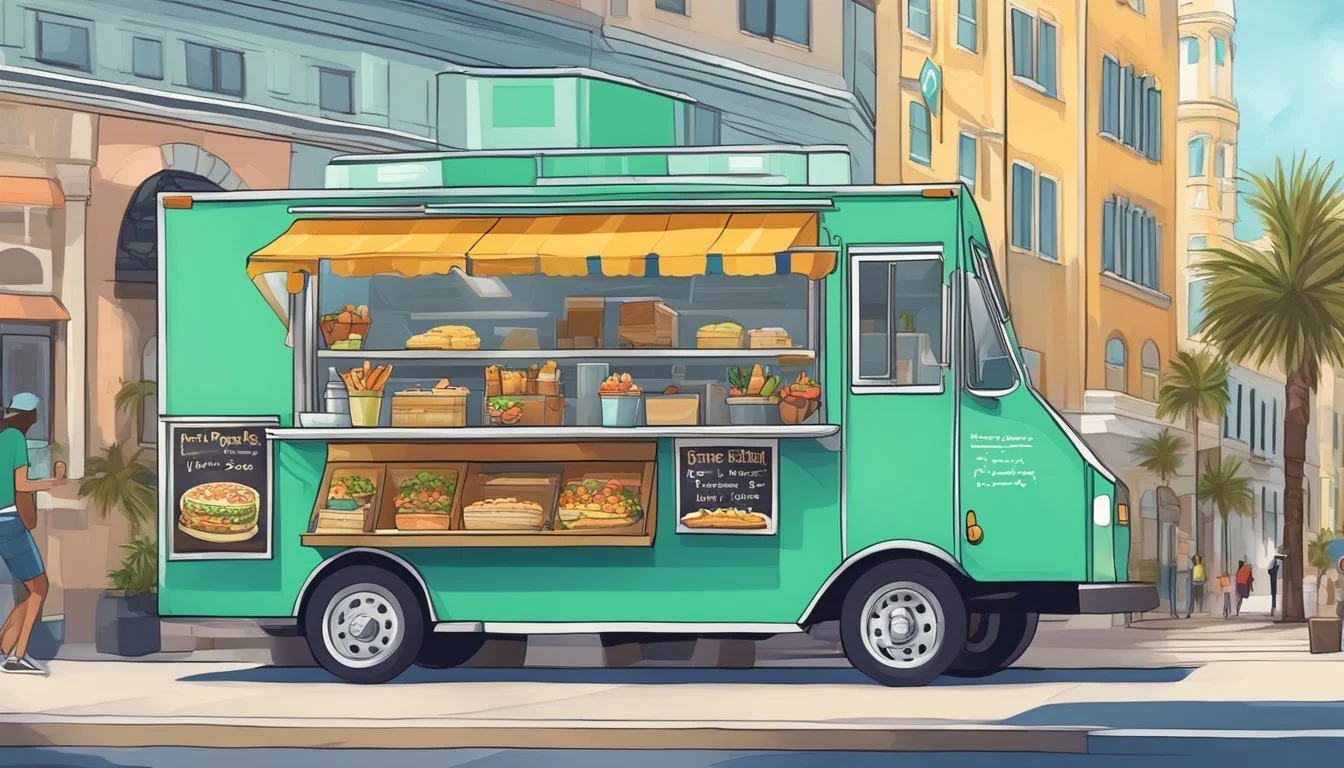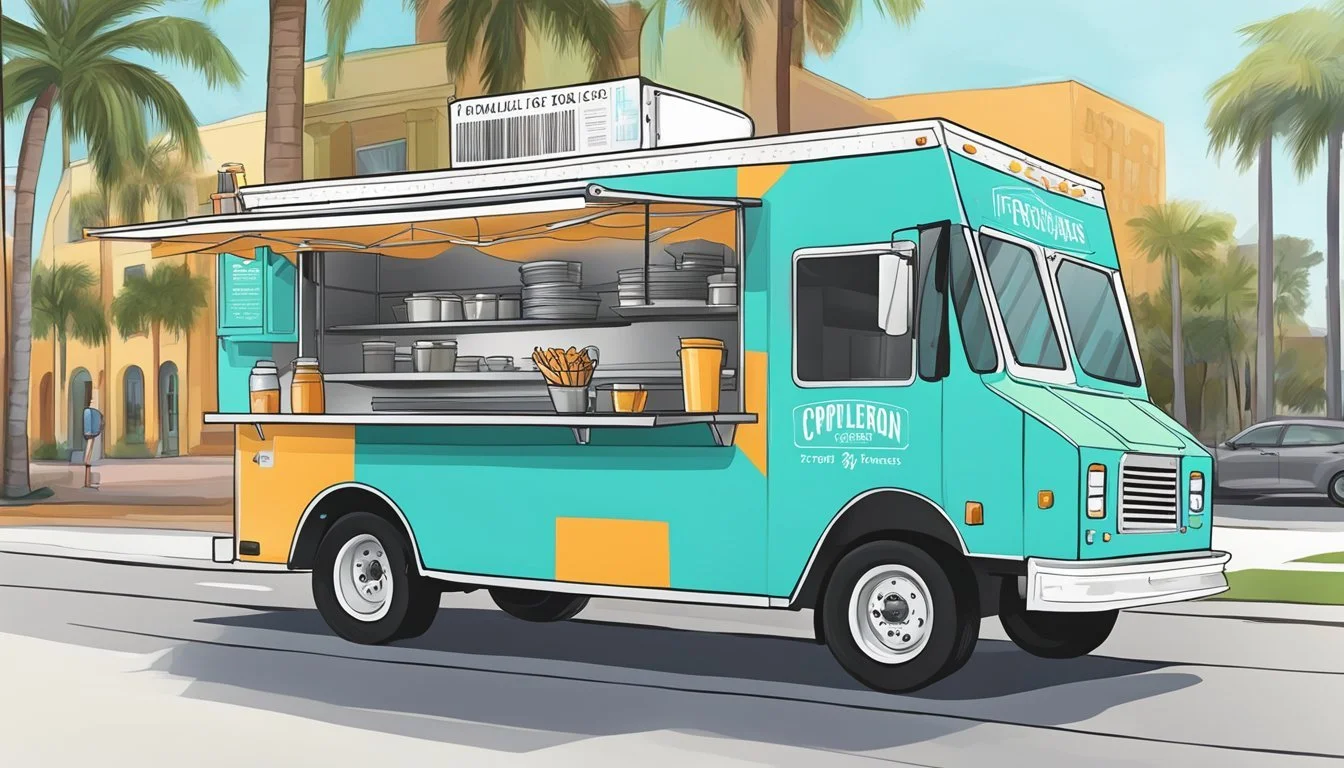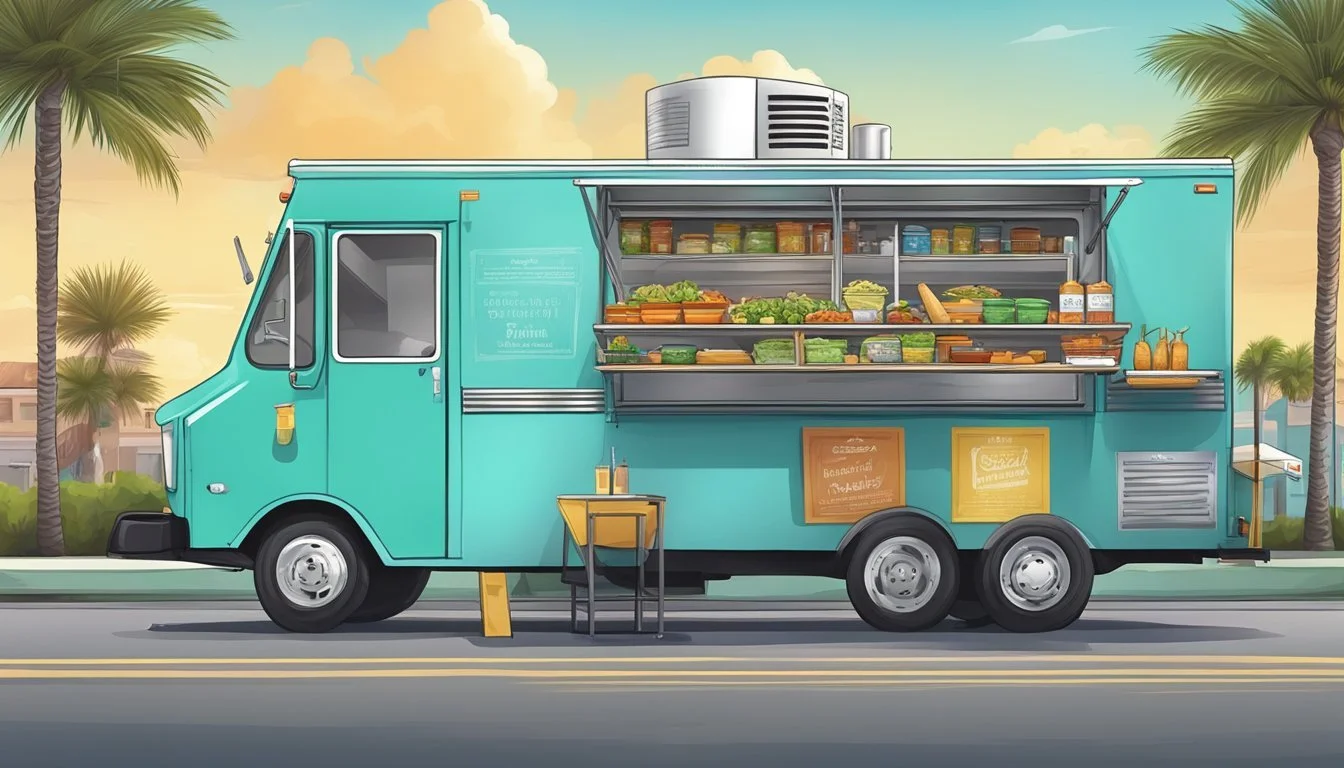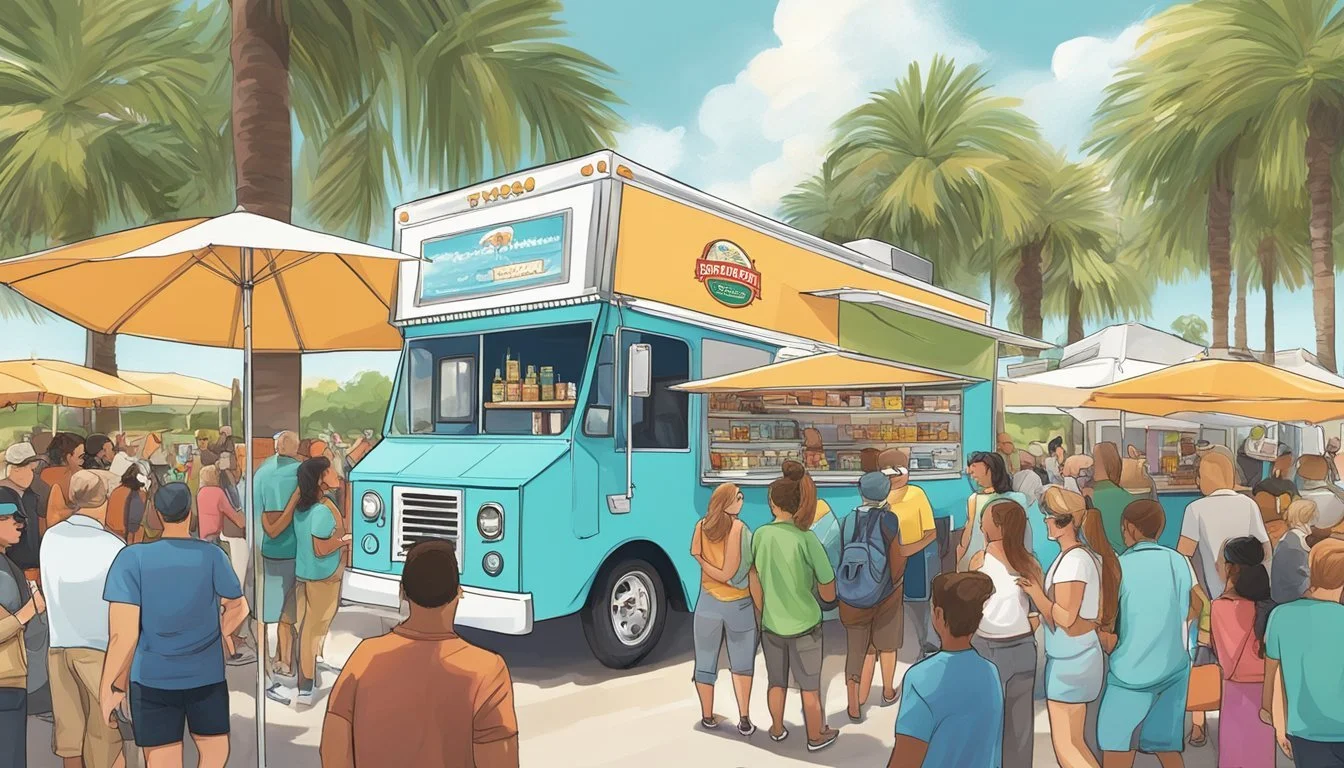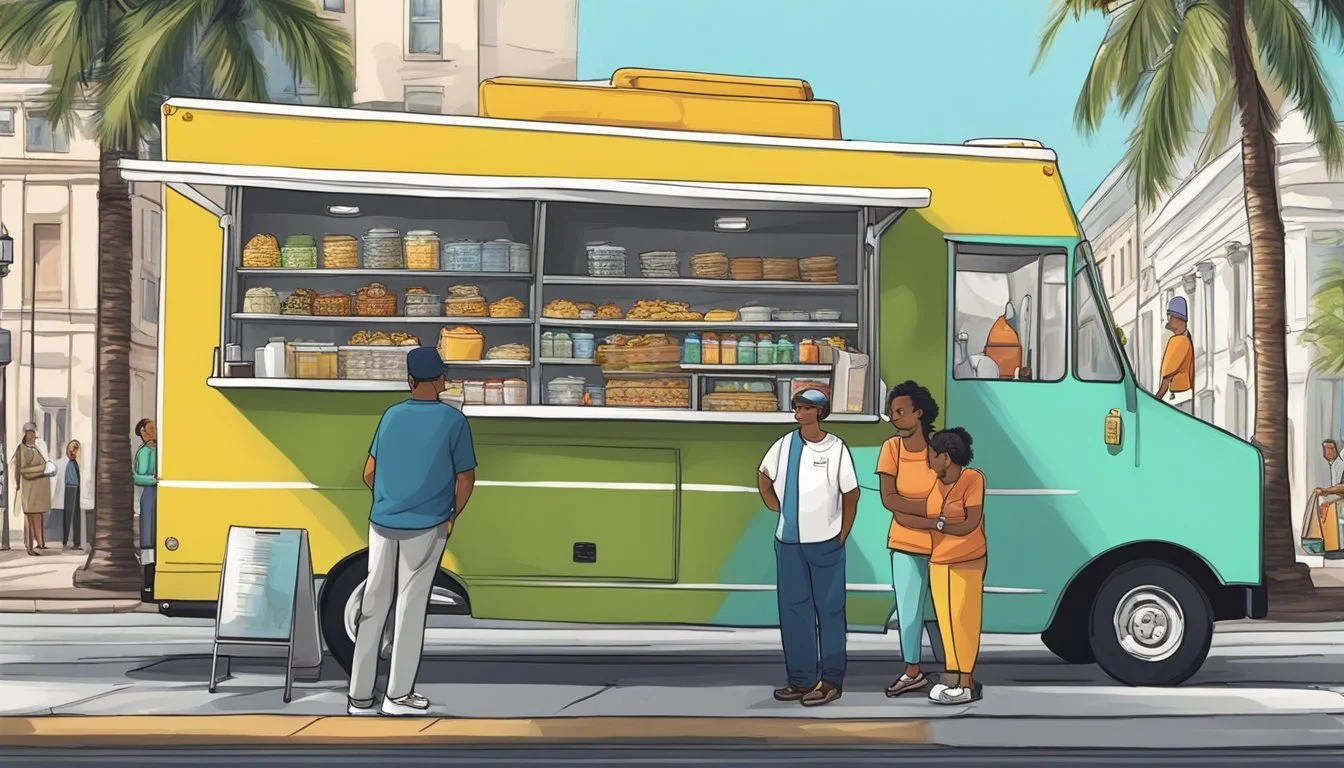Food Truck Laws St. Petersburg, Florida
Regulations and Compliance Guide
Navigating the regulations surrounding food truck operations in St. Petersburg, Florida, can be as essential to the success of one's mobile eatery as the menu itself. In recent years, the St. Petersburg City Council has updated local laws affecting food trucks, including measures concerning wage theft and operational ordinances. These changes have been made to streamline processes and align local requirements with those at the county and state levels.
Mobile food vendors in St. Petersburg must adhere to a set of guidelines to maintain compliance with public health standards and business regulations. Specific permitting requirements are necessary for both new and existing food service facilities, particularly regarding grease management. The Florida Department of Agriculture & Consumer Services provides state-level guidelines requiring mobile food establishments to comply with statutes and codes that not only ensure food safety but also delineate operational protocols.
Furthermore, the city code articulates certain land development regulations that mobile food vendors should follow, such as those related to vending locations and permissible operational hours. These rules may also be outlined in the St. Petersburg Municode Library, ensuring food trucks do not clash with local businesses and traffic flow, thereby creating a harmonious economic environment for both stationary and mobile food enterprises.
Starting a Food Truck Business in St. Petersburg
Initiating a food truck venture in St. Petersburg involves navigating the regulatory landscape to ensure compliance with the local and state requirements. Entrepreneurs must focus on proper registration and the acquisition of the necessary permits.
Business Registration and Licensing
The first step for entrepreneurs in St. Petersburg is to register their food truck business. This includes obtaining a business license. As per the Occupational Freedom and Opportunity Act, local governments in Florida cannot require additional business licenses or fees on top of the state requirements. However, it is crucial for food truck operators to check with local authorities for any specific regulations or registration processes unique to St. Petersburg.
Obtaining Permits
Food trucks in St. Petersburg are subject to a range of permits, such as those related to health and safety regulations, food service, and parking. The Florida Department of Agriculture & Consumer Services oversees the food service permit, which is mandatory for food trucks. For grease management, all food service facilities, including mobile food establishments, need to secure a permit from the Public Utilities department. Additionally, St. Petersburg may have specific guidelines on where food trucks can operate, requiring a local parking permit for designated areas within the city.
St. Petersburg Regulations
In St. Petersburg, food truck operators must navigate specific regulations that govern their location, parking, and operating practices. Adhering to these guidelines is essential for compliance with local regulations and maintaining the right to do business within the city.
Location and Parking Ordinances
Food trucks in St. Petersburg must adhere to clear location and parking ordinances. They are prohibited from conducting business in the public right-of-way unless part of a city-approved event. When choosing locations, operators should ensure they are on private property with explicit permission from the property owner. Certain areas, particularly in the downtown sector, are designated as Food Truck Free Zones where parking and vending are restricted. This ordinance is intended to manage the aesthetic quality and accessibility of these areas.
Permitted Locations:
Private property with owner consent
Designated Food Truck Zones outside of restricted areas
Restricted Areas:
Public right-of-way, unless part of a city-sanctioned event
Downtown St. Petersburg Food Truck Free Zones
Operating Hours and Zoning
Operating hours for food trucks in St. Petersburg are subject to zoning laws. These laws dictate the times during which food trucks may operate in different parts of the city, aligning with business and residential schedules. Typically, food truck operators must obtain zoning approval as part of the permitting process, which will outline the acceptable operating times based on their specific location.
Zoning Approval Requirements:
Obtain specific operating hours per zoning district
Align operations with business and residential area schedules
Example of Operating Hours:
Business Districts: 6 AM - 2:30 AM
Residential Areas: Restrictions apply; check with local zoning regulations
Operators should remain informed about the latest St. Petersburg food truck regulations to ensure their ventures operate within legal bounds and to avoid potential fines or disruptions to their businesses.
Financial Aspects of Running a Food Truck
Running a food truck in St. Petersburg, Florida involves navigating a series of financial commitments. Operators must account for costs such as fees and taxes, and meet certain insurance requirements to comply with local regulations.
Fees and Taxes
When starting a food truck business, owners should be prepared to handle various fees associated with permits and licenses. St. Petersburg has shifted some of its local controls in favor of county and state regulations, affecting the fee structure. One can expect to cover expenses for the initial permit application, as well as ongoing registrations and potentially special event fees for participating in festivals or community events.
In addition to fees, food trucks must stay on top of their tax obligations. They must collect sales tax on every transaction and remit it to the state. They are also subject to income tax and must report their earnings to the Internal Revenue Service (IRS). Proper bookkeeping is essential for accurately tracking revenues and expenses throughout the tax year.
Insurance Requirements
Insurance is another critical financial aspect of operating a food truck. Owners need to obtain adequate insurance coverage to protect their business. This often includes but is not limited to general liability insurance, vehicle insurance, and property insurance to cover the truck and its contents. St. Petersburg requires food trucks to have insurance to obtain and maintain their permits, ensuring the city and its citizens are protected in case of accidents or liability issues.
It is advisable for owners to engage with insurance agents who specialize in food truck businesses to fully understand the specific policy requirements. This may help them find the best rates and coverage options that suit their unique needs and risks associated with operating a mobile food vendor.
Health and Safety Standards
In St. Petersburg, Florida, food trucks are subject to rigorous health and safety standards, ensuring that consumer safety is a top priority. The Florida Department of Agriculture & Consumer Services (FDACS) oversees the enforcement of these regulations.
Permitting and Inspections All mobile food vendors must obtain the necessary permits before beginning operations. These permits affirm that the food truck meets the health and safety requirements set forth by state and local laws. Regular inspections are conducted to ensure ongoing compliance with these standards.
Food Handling Requirements
Potentially Hazardous Foods (PHFs): Foods that require time/temperature control for safety.
Water Supply: Trucks must have access to potable water for food preparation and hygiene.
Waste Disposal: Proper disposal methods for sewage and other waste materials.
Employee Health and Hygiene
Training in proper food handling and sanitation practices is mandatory.
Employees must exhibit good personal hygiene to minimize the risk of foodborne illnesses.
Equipment and Facility Standards Food trucks are required to maintain their equipment and facilities to prevent contamination and ensure food safety. This includes regular cleaning and maintenance of cooking appliances, food preparation surfaces, and storage areas.
Consumer Protection The FDACS also focuses on protecting consumers through educational initiatives and resources dedicated to raising awareness about food safety.
In conclusion, St. Petersburg upholds stringent health and safety regulations for food trucks to guarantee that the food provided to the public adheres to high-quality standards, reflecting a commitment to public health and consumer care.
Event Participation and Marketing
In St. Petersburg, Florida, food truck operators looking to engage in local events and markets must navigate specific permitting processes. Compliance with these regulations ensures legality and maximizes exposure.
Food Truck Rallies
Food truck rallies in St. Petersburg are a draw for both locals and tourists, offering a variety of cuisines in a single location. Operators must be aware that an annual permit is required to participate seamlessly in these gatherings throughout the year. The annual permit streamlines the process, allowing food trucks to join multiple rallies without the need to apply for a separate permit for each event.
Special Events Permitting
Special events in St. Petersburg that involve more than two food trucks necessitate a special events permit. These are one-off occasions, separate from the standard rallies, and include instances where food trucks assemble for a particular event. The city mandates that each food truck event receive food truck special event approval to ensure public safety and compliance with local ordinances. It's crucial for vendors to apply for this permit for each unique event to legally operate and market their offerings at these special gatherings.
Interaction with Local Authorities
In St. Petersburg, Florida, food truck operators must navigate local laws and maintain positive interactions with city officials, particularly the City Council, which has a significant impact on their business operations through legislation and policy setting.
City Council Relations
The relationship between food truck operators and the St. Petersburg City Council is defined by regulatory interactions and compliance with ordinances. In August 2020, the council showed support for the food truck industry by streamlining processes, as it unanimously passed measures to consolidate local requirements with county and state regulations. This legislative change involved the elimination of separate local licensing, permitting, and fees for mobile food vendors in favor of a more unified approach. Food truck operators are now primarily subject to county and state controls, thus simplifying their interactions with local authorities.
Darden Rice's Initiatives
Council member Darden Rice has been proactive in addressing issues related to the mobile food industry. Rice's initiatives included supporting changes that reduce the bureaucratic burden on food truck businesses. Under Rice's tenure, operators have seen efforts to ensure that local regulations are supportive of food truck enterprises yet mindful of public health and safety. This strategic balance reflects an understanding of the mobile food industry's importance to the city's vibrant culinary scene while maintaining oversight.
Challenges and Considerations
The Tampa Bay Area's growing market for food trucks presents unique challenges and legal considerations for local vendors. Understanding the nuances of operating within St. Petersburg versus broader county regulations is crucial for entrepreneurs.
Competition in Tampa Bay Area
Food truck operators in the Tampa Bay Area face significant competition, with an increasing number of vendors entering the market. Success hinges on differentiating one's culinary offerings and securing prime locations. Navigating this competition requires a strategic approach to menu creation and event participation to carve out a unique niche.
Navigating Local Vendor Laws
Understanding and adhering to local vendor laws is a critical consideration for food truck owners in St. Petersburg. Recent legislative changes have shifted some oversight from the St. Petersburg City Council to county and state controls, affecting licensing, registration, and permitting processes. This alignment with broader regulations is intended to streamline operations but requires vendors to stay informed and compliant with the current laws.
Opportunities for Growth
St. Petersburg's food truck scene presents promising opportunities due to recent regulatory changes. Food truck operators now have the potential to capitalize on less stringent laws, thereby expanding their businesses.
Mobile Food Trucks: As the city aligns with county and state controls, owners benefit from reduced bureaucratic hurdles. This change can lead to an increase in the number of mobile food trucks and a more varied culinary landscape.
Locations: The exploration of new locations for food truck operations can drive growth. Food trucks can extend beyond the downtown core to neighborhoods that previously had limited access to diverse dining options.
Private Property: Utilizing private property for food truck aggregation holds substantial potential. Properties that welcome food trucks can create dining hubs, as seen with St. Pete Social, fostering community engagement and consistent customer flow.
To maximize growth opportunities, food truck entrepreneurs should:
Build partnerships with local businesses for parking access.
Seek out underserved areas to establish a food truck presence.
Stay informed about local legislation affecting their operations.
Given St. Petersburg's adaptation to food truck trends, these entities can expect to see a positive shift in their business trajectory.

